Ondrej Markus
Entrepreneur in ed-tech, building the future of education as a founder and CEO at Playful.
I write about the future of education, designing learning games, and running a startup.
I'm a generalist, introvert, gamer, and optimizing to be useful.
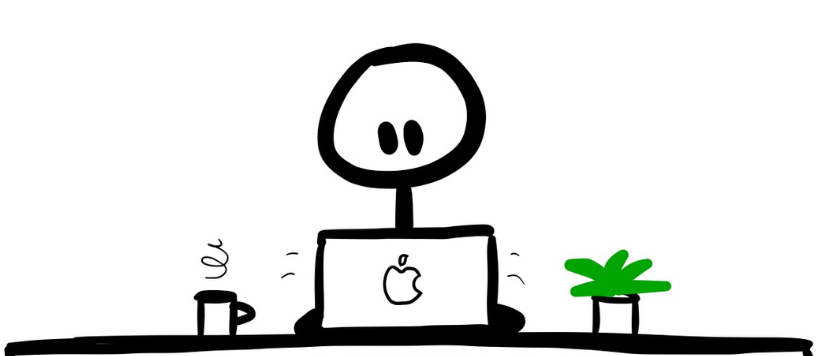
What the work happened: Q3 2022
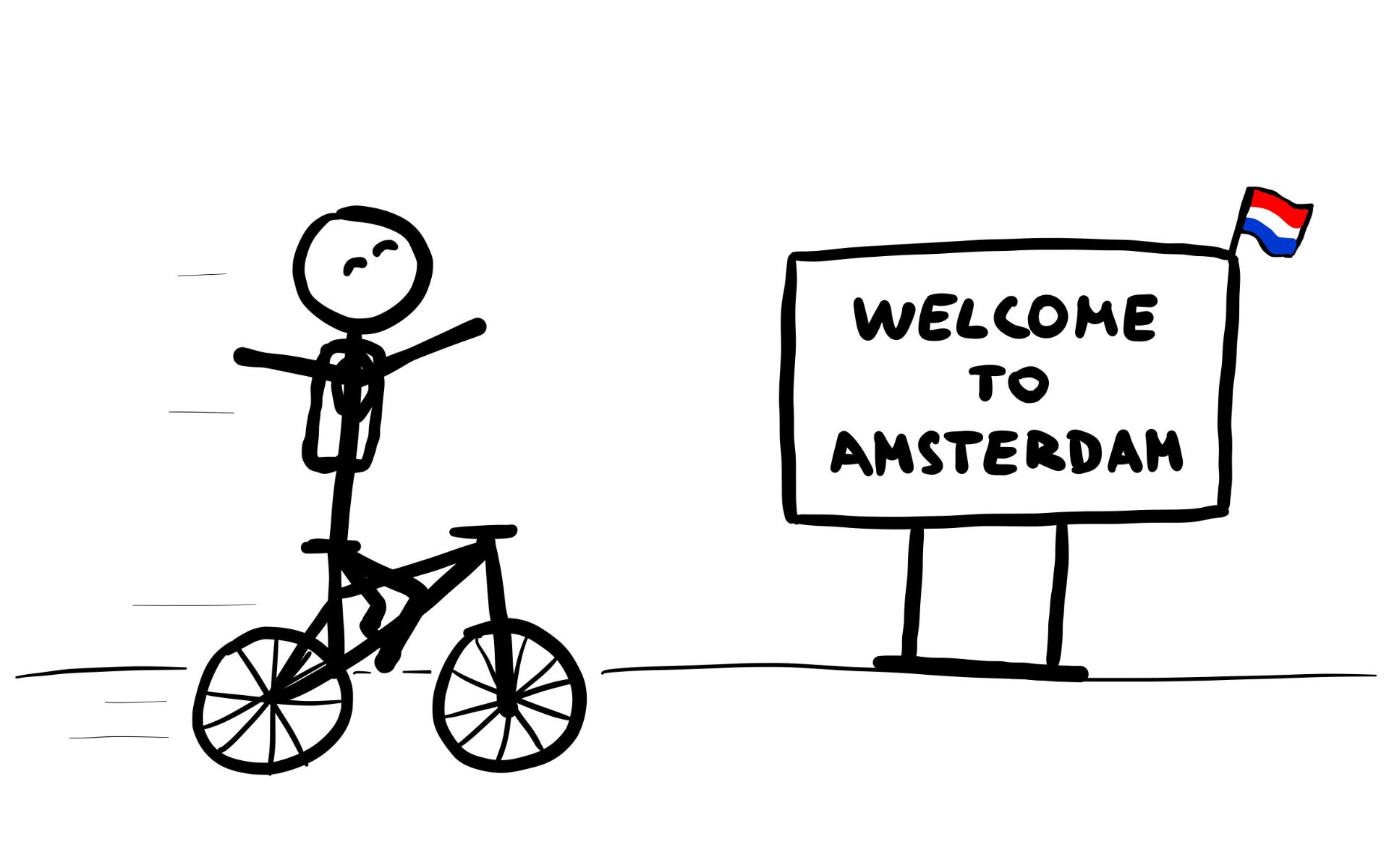
Hey there,
it’s been a while, I know.
I stopped writing and I’m not sure why. I guess it’s because moving to a different country turned out to be more mentally draining than I expected.
So let’s sum up what happened over the last three months. We should start where my last reflection ended. I said I’m going to do two things in Q3:
- “I will make games and talk about it.”
- “We will move to Amsterdam in September.”
Making games and talking about it
In July and August, I spent quite a lot of time exploring and experimenting with game design.
- I’ve read The Art of Game Design again, and listened to a bunch of podcasts about game design.
- I reached out to people who make games and talked to them.
- I visited local game design meetups in Prague where designers go test each other’s unfinished board game prototypes. That was super cool.
- And, most importantly, I made and tested my own board game prototypes with other people.
But. I didn’t work on games as much as I expected. And I wrote barely anything about games.
The only thing I published was the intro article about my intention to write more about games (Let’s talk games). And later I shared my first experimental design diary entry about prototyping board games.
That is all.
In June, I was wondering Why don’t I do what I say I want? And it seems like this question is still relevant now. Why do I keep saying to myself I want to make games but don’t spend that much time on it?
The practical excuse is that once August came around, both me and Lin started slightly panicking about the fact that we are moving to Amsterdam on 15th September, but we have nothing solved: apartment, jobs, selling stuff.
So the Survival mode kicked in and took over my brain. We started hunting down places to live in Amsterdam, looking for jobs, and selling things we are not taking with us.
I lived the life of a telemarketer for the next 3 weeks.
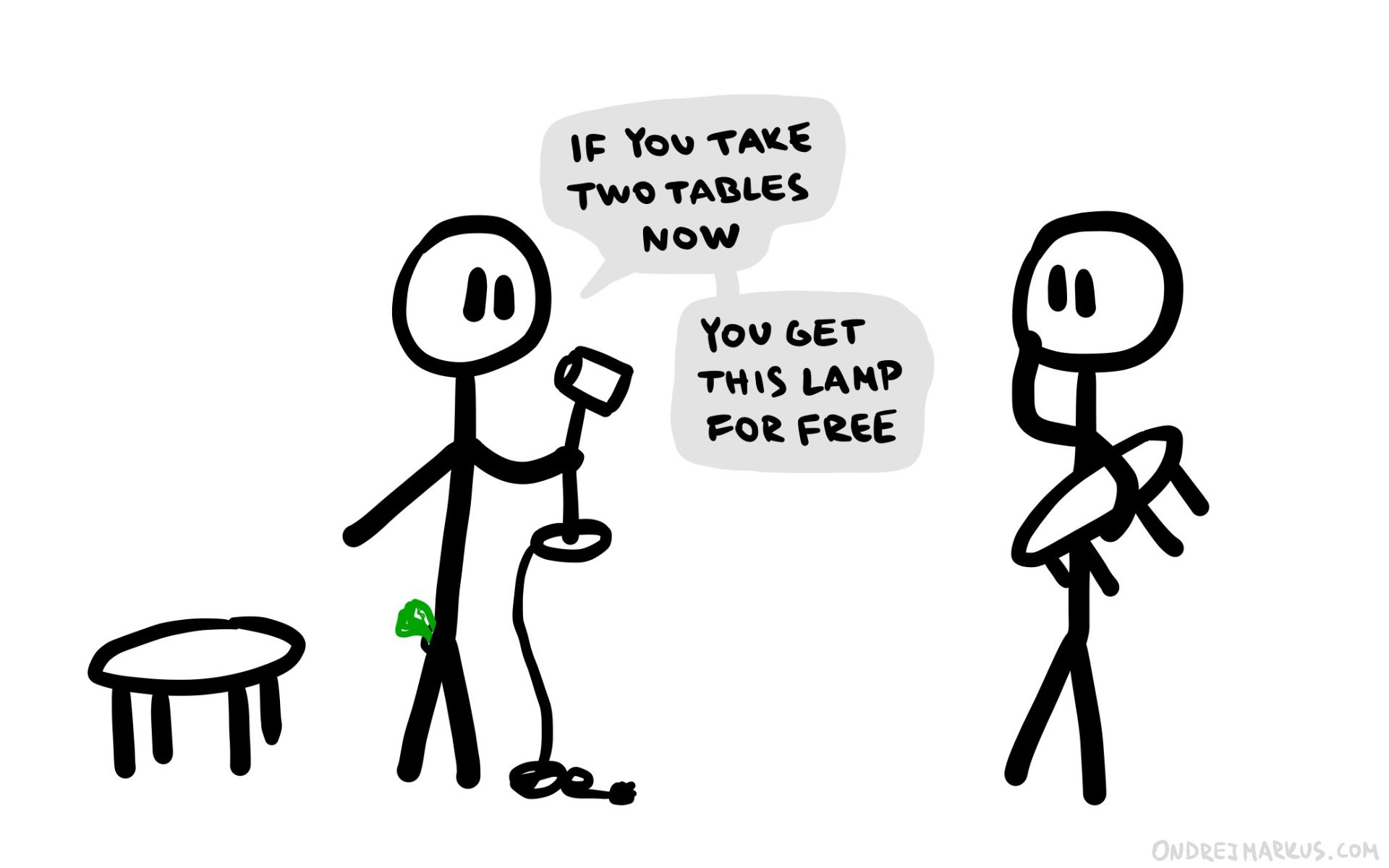
I sold almost everything I owned
This Survival mode is powerful. So once these existential problems of “Where are we going to live?” and “How am I going to make a living?” were at the top of my mind, it felt like I lost most of my capacity to think about other stuff.
Moving to Amsterdam
Finding a place to live in Amsterdam is next to impossible these days.
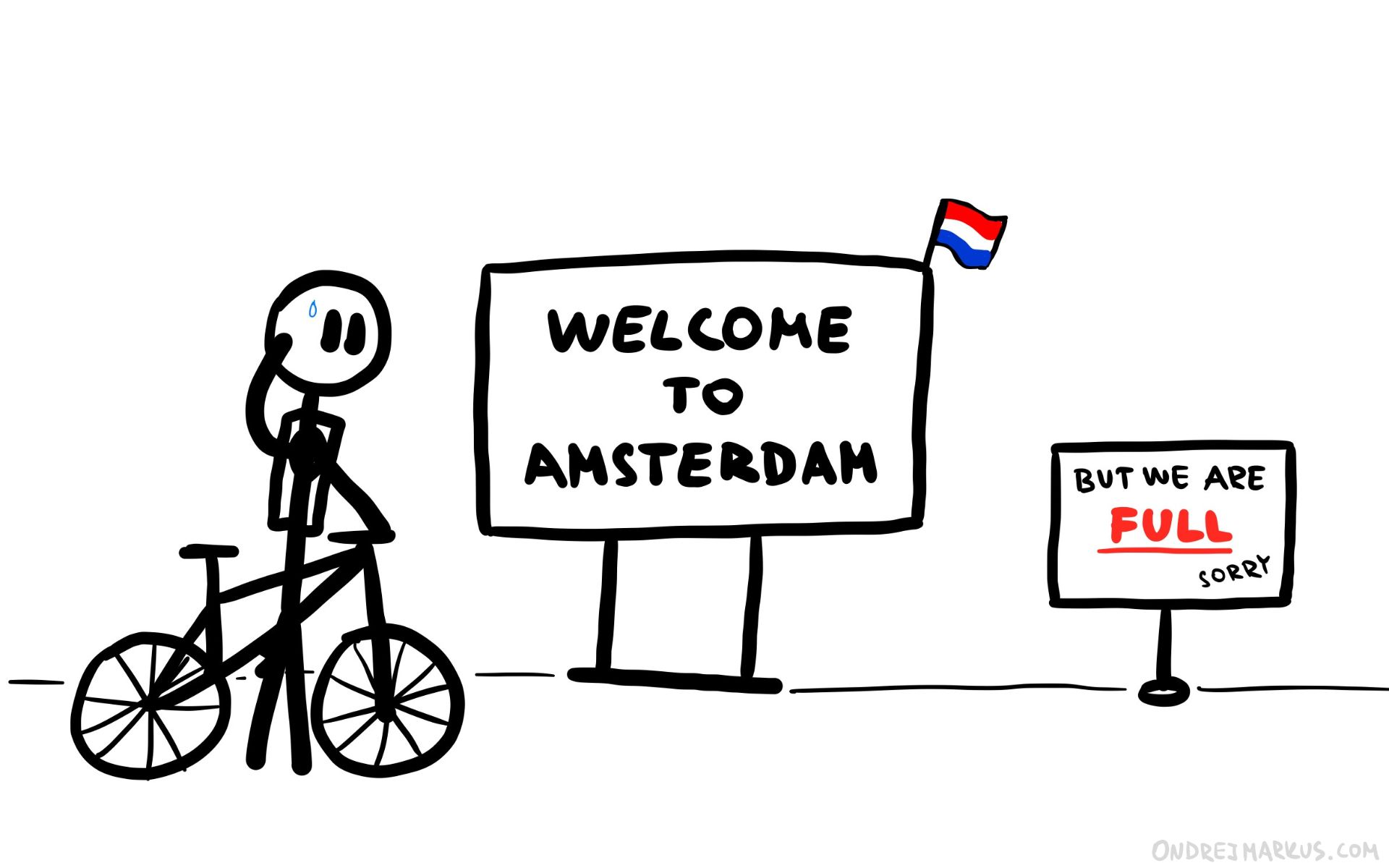
No empty apartments in Amsterdam
So, after the wild ride of looking for a place to live while being rejected a hundred times, we managed to get a temporary studio in the Student Hotel.
It costs a bit more than an average apartment in Amsterdam. We pay around 2300 euro per month for a small studio. A similar apartment would cost around 2000 euro these days.
But we have weekly cleaning, bikes, gym, co-work space, and washing machines included in the cost. So it evens out a bit. Also, we didn’t have to buy furniture or anything else. Everything was already here, which made our transition much smoother.
And if we need something, we can just ask at the reception and they will solve it. This is dangerous. I’m getting addicted to having a 24/7 reception very quickly.
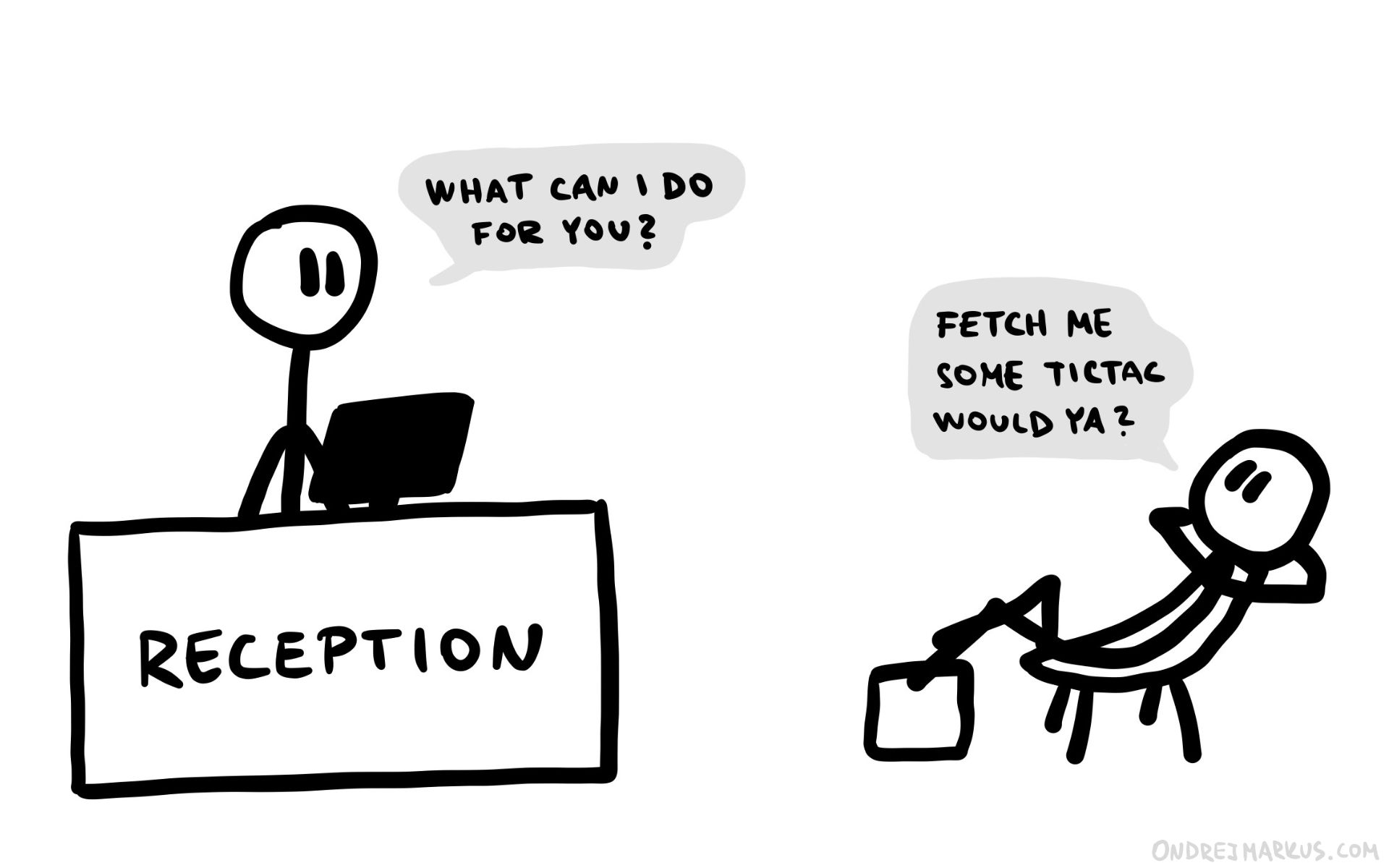
My increasing reception addiction
Also, having gym 30 steps away from my room is superb. I’m exercising every day again because it’s so easy to go.
So this crazy thing actually happened. I’m writing this from a comfortable chair in Student Hotel’s library in Amsterdam, Netherlands.
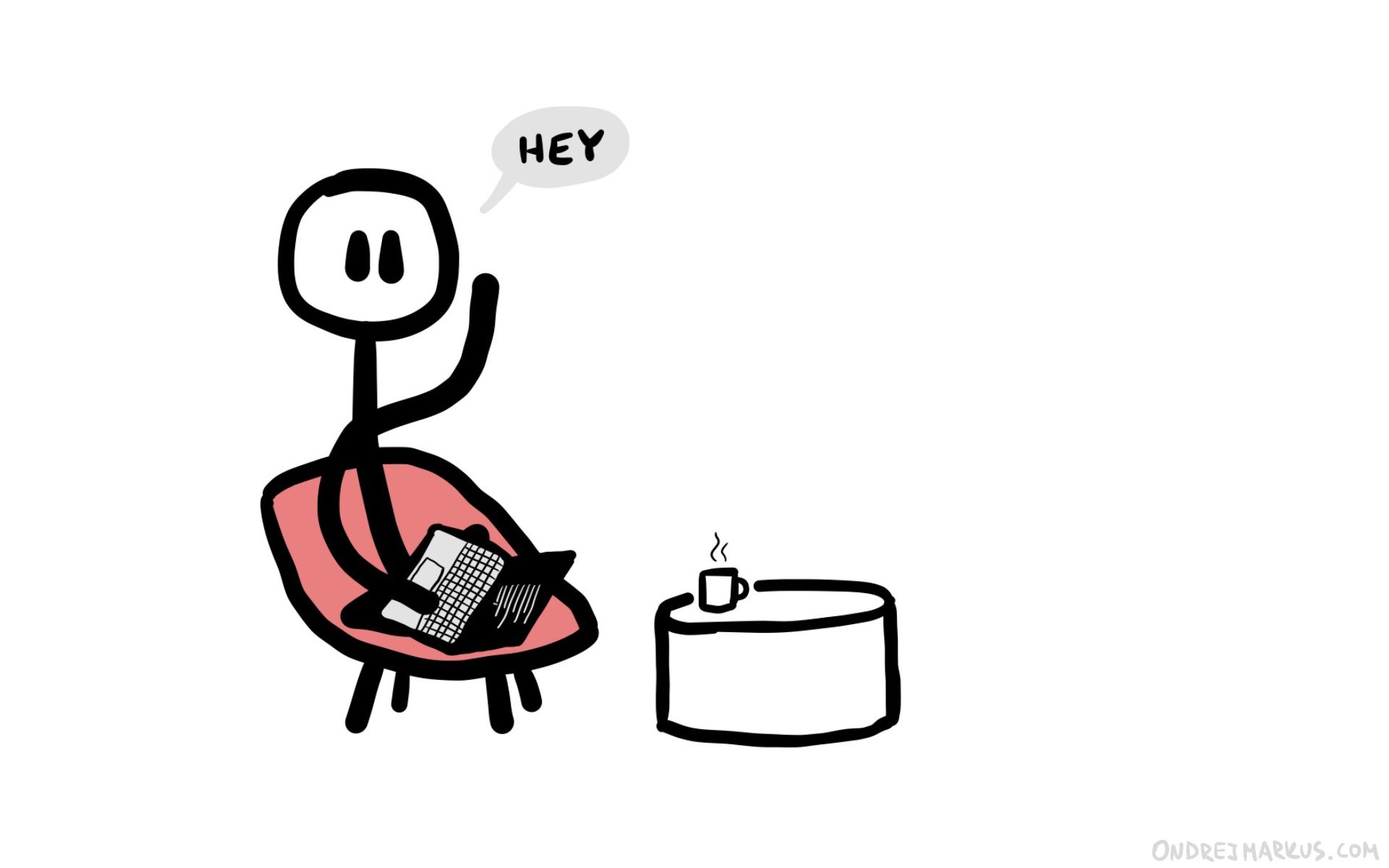
That’s me! In Amsterdam!
So how is Amsterdam so far?
We’ve been here for 3 weeks, but I’m still feeling like I’m on vacation. I guess that’s normal when you move to a completely different environment. Nothing is familiar, everything is new.
I was careful not to set my expectations too high going here. We didn’t see the room ahead of time except for a few generic pictures. We didn’t know how the hotel works. And we didn’t know how the people here are going be.
However, everything is better than I expected so far. The hotel is super nice, people are friendly, and the city is even more beautiful than I remembered.
Also, I’m doing my best to be proactive here. It wouldn’t make sense to come to a new city and hide in your room. So I started doing some things immediately after arriving to Amsterdam:
- Biking everywhere: I love biking. I biked every day in Prague even though biking there sucks compared to Amsterdam. Amsterdam is THE city for riding a bike. I mean, the conditions for biking here are just stelar. The city is built for bikes. So I’ve spent a lot of time exploring different neighborhoods on two wheels.
- Joining board game groups: Games are my go-to way of meeting new people. So I’ve joined a couple of Discord servers and went out to play games with strangers to make some new friends. I’ve been out 5 times already, playing mostly Root and Oath. Board gamers are used to meeting new people all the time. If you want to meet people, go to board game meetups.
- Organizing board game nights: As I said, I favor games as a way to connect with people. So I’ve asked the hotel’s event manager to help me organize a Blood on the Clocktower game night to get to know some of the folks who live here. I also used the BotC app to ran my first online game of Blood on the Clocktower to stay in touch with friends in Prague, and it was great. Highly recommended.
I’m still settling down, getting to know the environment. My plan is to meet even more people here, and get to know Amsterdam better riding on a bike everywhere in the upcoming weeks.
Okay. Now back to the work stuff.
What am I going to work on next?
This is the most burning question on my mind for the last few weeks.
Once we decided to move to Amsterdam in July, I knew I need to get a new job because Amsterdam is expensive. My savings would not last here very long.
Although, working in an international setting for the first time is an exciting challenge, so I’m actually eager to get a cool job, do my best, and learn something new. After all, that was one of the core ideas behind the experiment of moving to a different country.
So, in August, I started looking for companies I might want to work with. Over the next few weeks, I’ve reached out to five companies I thought would be a pretty good fit. I remember I said to myself “I would be very surprised if none of these worked out.”
However, three told me “no thanks”, and the other two didn’t even reply. Oops. I was very surprised indeed. Maybe I’m not as hot hot hot as I thought I was.
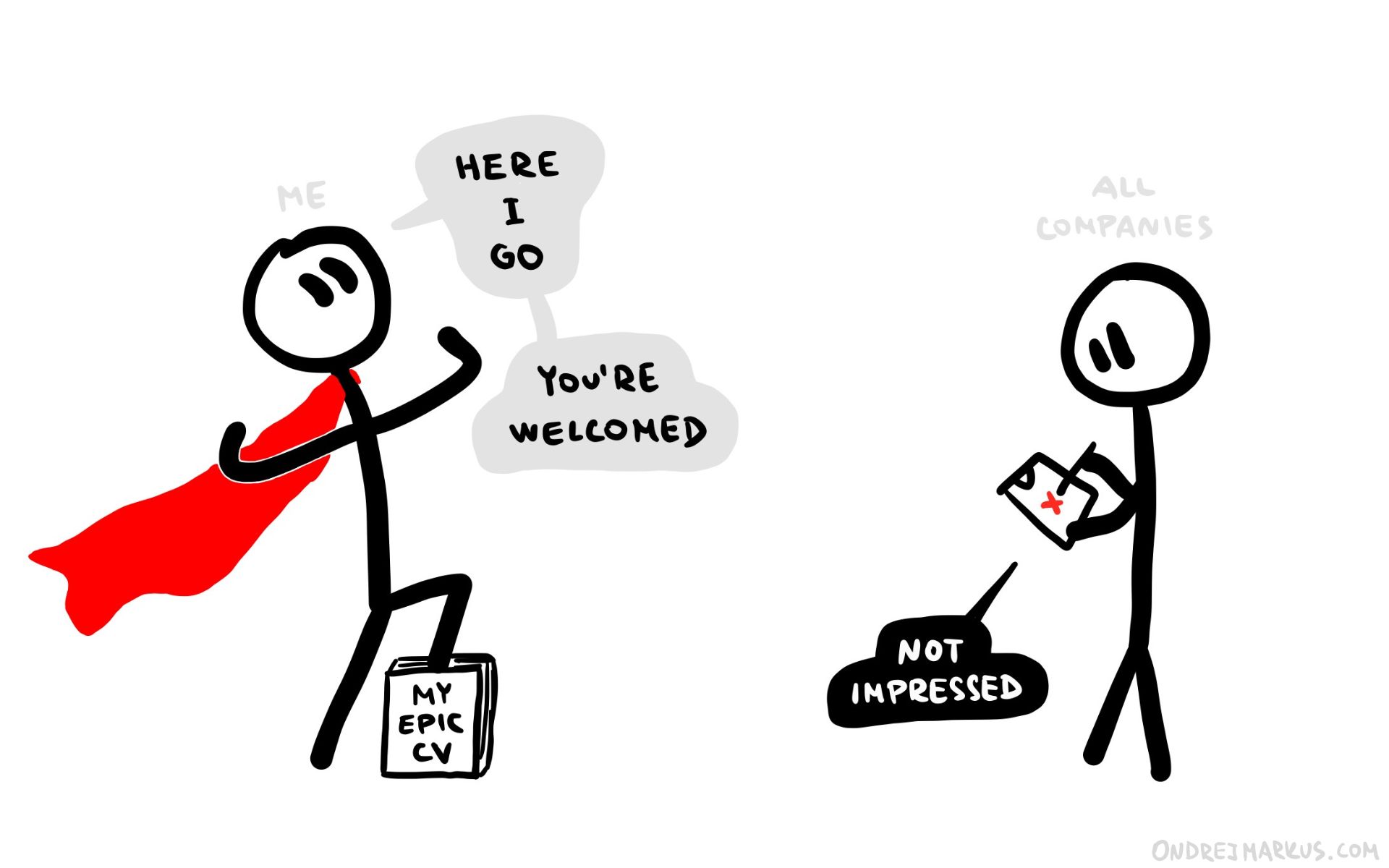
Companies are not impressed with me
I didn’t have to apply for a job for the last 8 years. I went from project to project because people liked my work and offered me jobs or cooperation before I had to ask for it. I got spoiled, man.
I had a second look at my process, and I had to admit I kinda half-assed my CV and portfolio for the first batch of job applications. I though it’s going to be good enough because I’m going to amaze everyone once I get to the interview. But it never got to the interview. A critical mistake in otherwise perfectly lazy efficient plan.
So I stepped up my documentation and started looking for more opportunities.
However, I noticed I’m now considering a much wider range of jobs in companies I would normally not care about. Why? It’s the Survival mode getting into my head again.
Those rejections made me doubt myself. My brain got scared and started pushing an agenda of “better get something than end up with nothing.”
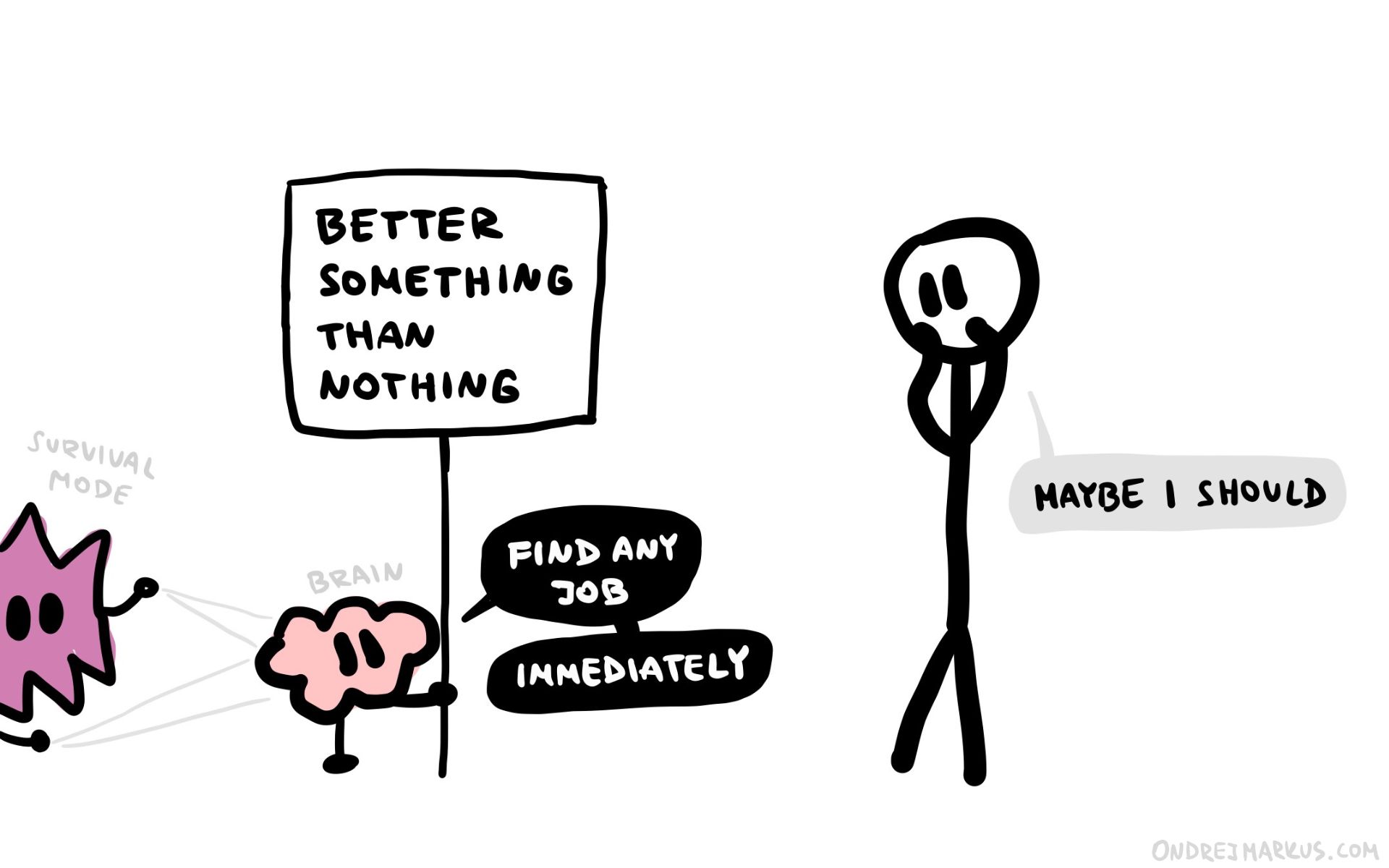
The Survival mode strikes again
At first, I didn’t realize this is happening. I just felt a strong resistance towards sitting down and actually applying to those jobs. I was procrastinating it for days. My frustration was rising.
I was confused. So I sat down for a reflection to examine what the hell is happening. And I found a conflict between two different things I want.
A part of me wanted the immediate security and comfort of any well-paid job. This was the Survival mode again, feeding on my fear arising those earlier rejections.
But the reasonable long-term thinking part of me knows that if I get a job just to check the income variable from my list, I will be unhappy very quickly after that. It would be only a short-term bandage for my money situation.
Of course, the Survival mode doesn’t care about the long-term. It cares only about here and now, and maybe next week. Once the short-term is safe, it goes to sleep. Its job is done. But then the Reasonable mode has to figure out how to live with those decisions.
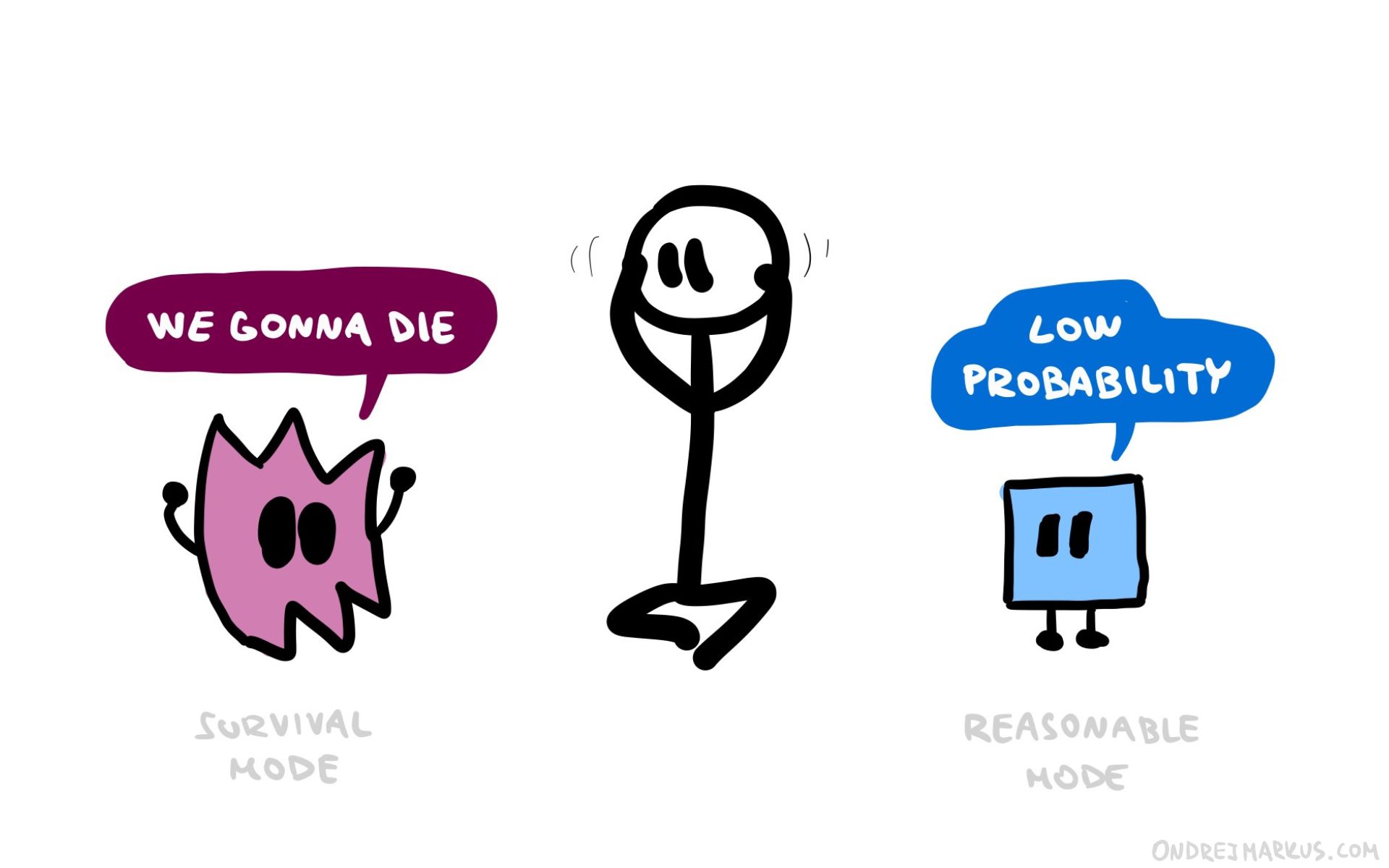
Conflict of interests
My solution was to take a few days away from job-hunting and think deeply about what I actually want to do, so I can seek opportunities that fit my real long-term needs, not just short-term fears.
In the end, I realized that next to making enough money, the most important condition a job needs to fulfill for me is this:
I want a job that enables my natural curiosity, instead of overriding it.
What does it mean?
I had jobs before that forced me to put my natural curiosity aside. And I told myself I will make enough time after or in between the work to follow my curiosity on other topics, but I didn’t have the time, energy, or attention to actually do it.
I don’t want this to happen again. I want a job that wants me to spend time thinking about what I already naturally am curious about. Even if getting a job like that will take an extra month or two, it’s worth it.
Don’t get me wrong. Having a job and working on side projects can work well. I just know myself well enough to realize I’m bad at doing things I don’t enjoy. However, when I get a responsibility for a project, I can’t help myself but go all-in and try my best.
So being a product manager or designer in a company where I don’t really care about the product and mission is not going to work. I could do an okay job, but I would have to push myself and never do an excellent job anyway. And I would not be okay with that. Everyone would be unhappy.
Anyway.
I’ve written down what three aspects of what the job should want me to pursue, and what its approach to work should be like. If the job/company is strong in at least two of these, it’s good enough. If it had all three, that’s the dream.
- Design: I prefer creating over managing. I can do both, but I’d rather if the core of the job was using my design skills to make things, not being a manager.
- Learning: I’m deeply interested in behavior change, new ways to learn, and how we can apply them to improving the way we educate ourselves.
- Games: I love games. So if I could choose one medium in which to express my skills, it would be making games or playful experiences. (Ideally playful educational experiences.)
After figuring this out, I leveled up my portfolio again and reached out to four companies that fit these areas well. That was like a week ago, so I’m still waiting for responses.
I realize it might not work immediately because the competition is huge in cool companies doing cool things around games and education. But that’s alright. I would rather take my time finding a really good fit than rush into something just to secure an income I don’t really need yet. It feels like a good investment of my savings. What else would savings be for?
In the meantime, I’m writing again. And I only now realize how much I missed it. It’s one of those things I don’t immediately realize I’m missing once I stop doing it. The lost benefits are not instantly obvious to me. My life just gets worse.
Writing became such an essential part of my sense-making process that I should never stop writing regularly. I already know I’m soon going to forget I said this.
Oh well.
I’m not sure what I’m going to write about exactly. I’m very curious about the intersection of games and learning: How can we use games to enhance learning?
So I will probably write to explore that.
I’m tempted to commit to a regular schedule again. Maybe publishing one article every week would be a great way to kickstart the habit again. I don’t know. For now I’m just sending this reflection out into the world.
That’s it.
There’re billion more things I’d want to tell you about, but I don’t want to overdo it. It’s long enough already.
So I’m going to keep it for the newsletter that is (hopefully) coming someday soon.
Have a fun day.
Bye.